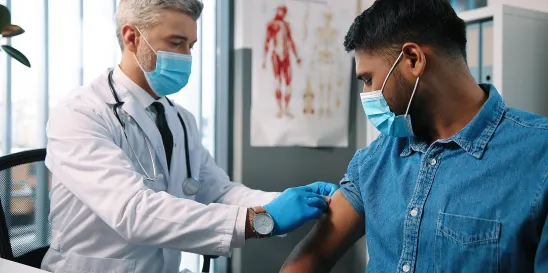THIS WEEK’S DOSE
- US Congress Comes to Appropriations Agreement: The House sent the second round of spending bills to the Senate to avoid a protracted partial government shutdown (though the Senate may need to work past the midnight deadline to complete consideration of the package).
- House Energy & Commerce Committee Moves Forward 17 Health Bills.
- House Committees Hold Health Hearings: Both the Ways and Means and Appropriations Committees heard from US Department of Health and Human Services (HHS) Secretary Becerra on the president’s budget; Ways and Means also held a field hearing in Denton, Texas, on the importance of emergency medical care, and the Energy and Commerce Health Subcommittee held a hearing on diagnostic test regulation.
- Senate Judiciary Committee Holds Hearing on Reproductive Rights: The committee discussed the consequences of Dobbs v. Jackson Women’s Health Organization on reproductive healthcare.
- Administration Holds Meeting with Insurers on Change Healthcare Cyberattack: HHS convened payers to further call for concrete actions to mitigate harms to patients and providers caused by the cyberattack on Change Healthcare.
- President Issues EO on Women’s Health Research: The executive order (EO) directs actions to improve and expand women’s health research.
- CMS Innovation Center Announces ACO Primary Care Flex Model: The Centers for Medicare & Medicaid Services (CMS) announced the model will test how prospective payments and increased funding for primary care can encourage participation in accountable care organizations (ACOs).
CONGRESS
Appropriations Update. On March 20, Congress released bill text for the second (and final) tranche of fiscal year (FY) 2024 appropriations bills, which include: Defense, Financial Services, Homeland Security, Labor-HHS, Legislative Branch and State-Foreign Operations. The bill provides $117 billion for HHS, an increase of $955 million above FY 2023 levels. The deadline for Congress to advance this final package of FY 2024 spending bills is March 22.
The House passed the bill on March 22 by a vote of 286 – 134. Speaker Johnson (R-LA) relied on Democrats to advance the bill in the face of ongoing resistance from the most conservative wing of his party, with less than half of Republicans supporting the measure. While the Senate is moving towards passage, possibly in advance of the midnight deadline, a brief weekend partial shutdown is still possible if there are delays, though no negative impacts are anticipated if it is limited to the weekend. President Biden is expected to sign the bill into law shortly after Senate passage.
Despite ongoing speculation in recent weeks, this bill does not include any additional healthcare policies that continued to be pursued after passage of the first government funding bill earlier in March. Those policies included pharmacy benefit manager reforms, healthcare price transparency and the SUPPORT Act. Instead, the next prospect for these and other health policy priorities is likely to wait until the post-election lame duck session.
House Ways & Means Committee Holds Field Hearing. For the hearing, members traveled to Denton, Texas, and examined the challenges and opportunities surrounding recent investments in emergency care services and how to strengthen access to emergency care. Republicans focused on the implementation challenges of the No Surprises Act, and Democrats focused on the impacts of reproductive medical care state laws. There was bipartisan concern about access to emergency care in rural areas and air ambulance services, as well as questions focused on the benefits and challenges of adopting the rural emergency hospital designation and expanding the freestanding emergency center model.
House Energy & Commerce Committee Markup of 17 Health Bills. The committee advanced 17 bills designed to support patients and caregivers in the areas of Alzheimer’s disease, breast cancer screening, cardiomyopathy, end-stage renal disease medications and Down syndrome. While 16 of the health-related bills advanced out of the committee unanimously, the following bill passed with opposition from Democrats, citing concerns about timely and affordable access to kidney care:
- H.R. 5074, Kidney PATIENT Act:
- Advanced by a vote of 37 yeas and 10 nays.
- Members who voted “nay” include Ranking Member Pallone (D-NJ), Reps. Peters (D-CA), Dingell (D-MI), Craig (D-MN), Schakowsky (D-IL), Matsui (D-CA), Castor (D-FL), Sarbanes (D-MD), Tonko (D-NY) and Veasey (D-TX).
House Ways & Means Committee Holds Hearing on President’s FY 2025 HHS Budget. This was a continuation of HHS Secretary Becerra’s appearances to promote the president’s healthcare priorities in his budget. During the hearing, many representatives discussed their views and issues with the nursing home staffing mandate. Multiple Republican members discussed the southern border crisis and its impact on the healthcare system. They also discussed the need for an increased focus on the fentanyl crisis from the Biden administration. Many Democrats expressed their support for the budget and the Biden administration’s commitment to addressing the major healthcare issues facing the nation.
Senate Judiciary Committee Holds Hearing on Reproductive Rights. The hearing discussed the challenges women face in accessing reproductive care in light of the recent Alabama Supreme Court ruling limiting access to in vitro fertilization (IVF), as well as challenges faced in the post-Dobbs environment. During the hearing, there was bipartisan support for IVF. Democrats focused on allowing women to make their own reproductive choices. Republicans focused on finding a limit on abortions that a majority of Americans support.
House Energy & Commerce Health Subcommittee Holds Hearing on Diagnostic Test Regulation. In the hearing, members discussed the US Food and Drug Administration’s (FDA’s) proposed rule to regulate lab-developed tests and alternative approaches to diagnostic regulation. There was bipartisan and witness support for the Verifying Accurate, Leading-edge IVCT Development Act. Republican members expressed concern that the FDA proposed rule may be an overreach of authority.
ADMINISTRATION
Administration Holds Another Meeting with Insurers on Change Healthcare Cyberattack. Since the last meeting, HHS surveyed payers for data and information relating to actions to help providers resolve issues stemming from the cyberattack. During this meeting, HHS officials discussed the adjustments made to improve claims processing, but urged payers to provide more financial support to providers who remain in need, particularly those serving vulnerable populations, rural hospitals and smaller institutions. They made clear the government and private sector must continue to work together to help providers make payroll and deliver timely care.
Representatives from the participating insurers offered updates on their efforts and outlined additional specific actions they will be taking to resolve outstanding issues. HHS and White House leadership pressed insurers to be targeted and specific in carrying out solutions, including increasing advanced payments, where needed, to the providers and communities still most in need.
A readout of the meeting can be found here.
President Issues Executive Order on Women’s Health Research. The EO focuses on the following objectives: integrating women’s health across the federal research portfolio; prioritizing investments in women’s health research; galvanizing new research on women’s midlife health; and assessing unmet needs to support women’s health research. The White House also announced more than 20 new actions and commitments by federal agencies, including the launch of a $200 million initiative led by National Institutes of Health (NIH) that will fund interdisciplinary women’s health research. Some of the other actions include:
- ARPA-H: Transformative research and development in women’s health.
- FDA: New initiatives to protect and promote the health of women.
- CMS: Inclusion of women’s health needs in National Coverage Determinations.
- Centers for Disease Control and Prevention and the Health Resources and Services Administration (HRSA): Leveraging data and quality measures to advance women’s health research.
- Agency for Healthcare Research and Quality: Initiative on primary care and preventive services for women.
- Substance Abuse and Mental Health Services Administration: New comprehensive women’s behavioral health technical assistance center.
New ACO Primary Care Flex Model. The CMS Innovation Center announced a voluntary new model, called the ACO Primary Care Flex Model, which will be available for certain ACOs participating in the Medicare Shared Savings Program (MSSP), the national ACO program under Medicare.
To encourage smaller organizations to participate in the MSSP, “low revenue” ACOs in the MSSP will be eligible to apply for the model. A “low revenue” ACO means an ACO whose total Medicare Parts A and B fee-for-service revenue of its ACO participants is less than 35% of the total Medicare Parts A and B fee-for-service expenditures for the ACO’s assigned beneficiaries, based on expenditures for the most recent calendar year for which 12 months of data are available.
Selected ACOs will receive a one-time advanced shared savings payment and monthly Prospective Primary Care Payments (PPCPs). The PPCPs will go to the ACOs and their participating primary care providers, including federally qualified health centers and rural health clinics, to address the medical and health-related social needs of their patients.
The application will open in May 2024 and will be due in August 2024. Learn more by reading the model fact sheet and the CMS press release. Additionally, CMS will host a webinar on the model on April 4 from 2–3 pm ET. Visit the webinar registration page to sign up.
QUICK HITS
- GAO Releases Supplemental Material on Autism Report. The US Government Accountability Office (GAO) released supplemental material to make its initial autism report more accessible to certain people with autism and other intellectual and developmental disabilities. GAO made two recommendations: HHS should (1) develop a process to clearly track and report progress toward the Interagency Autism Coordinating Committee’s goals, and (2) ensure that the NIH documents the steps its Office of National Autism Coordination uses to make sure federal autism activities are not unnecessarily duplicative. HHS concurred with the recommendations.
- House Energy & Commerce Committee Launches Bipartisan Oversight Inquiry into UNOS. Bipartisan leaders of the Energy and Commerce Committee launched an investigation into the United Network for Organ Sharing (UNOS), the sole contractor responsible for operating the Organ Procurement and Transplantation Network (OPTN). The leaders are also seeking information from HRSA regarding ongoing reforms.
- CMS Releases Guidance for Weight Loss Drug. CMS provided coverage guidance to private Medicare Part D drug plans for the weight loss drug Wegovy, which earlier this month received FDA approval to reduce heart attack and stroke risk in addition to obesity. Medicare Part D drug plans can cover Wegovy, but only when prescribed to reduce the risk of heart attacks.
- HHS-OIG Publishes Impact Brief on MA Prior Authorization. In the report, the HHS Office of Inspector General (HHS-OIG) said that United, Cigna and Aetna Medicare Advantage (MA) plans reduced the number of services that require prior authorization by up to 20% in fall 2023.
NEXT WEEK’S DIAGNOSIS
Congress is scheduled to be in recess next week and the following week for its annual spring recess. The Senate is scheduled to return to session on April 8 and the House is scheduled to return to session on April 9. We await the release of annual CMS payment rules.







 />i
/>i
